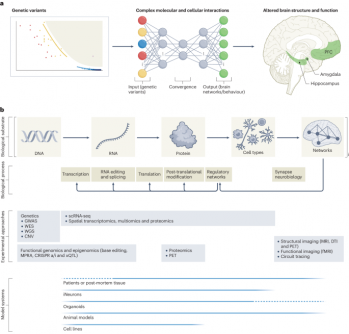Researchers from the University of North Carolina and Karolinska Institutet have published a detailed overview of schizophrenia genetics in Nature Reviews Neuroscience. This work sheds light on the intricate interplay of genetic and environmental factors contributing to this challenging neuropsychiatric disorder.
Unraveling the Genetic Tapestry of Schizophrenia
Schizophrenia, a condition marked by recurring psychotic episodes, has long been known to run in families. Recent genomic studies have identified nearly 300 common genetic variants and over 20 rare variants as significant risk factors for the disorder. These findings come from extensive genome-wide association studies and whole-exome sequencing, revealing a complex genetic landscape.
Dr. Patrick Sullivan, lead author and Distinguished Professor at UNC School of Medicine, explains the significance: “The findings to date resoundingly indicate complexity. Rather than being a deterrent to future research, this knowledge underscores the importance of accepting schizophrenia as a genetic and environmental enigma and scaling our research accordingly in our efforts improve the lives of those impacted by schizophrenia.”
This genetic complexity, known as “polygenicity,” challenges our understanding of schizophrenia’s underlying mechanisms. Unlike disorders caused by a single gene mutation, schizophrenia involves multiple genetic factors interacting in ways we’re still working to comprehend.
Beyond Genetics: The Role of Environment
While genetic factors play a crucial role, the researchers emphasize that environmental influences cannot be overlooked. Factors such as lifestyle, drug use, poverty, stress, and birth complications also contribute to schizophrenia risk. Although these environmental elements are more challenging to study than genetic factors, they offer potential avenues for intervention and prevention.
The review highlights the need for a holistic approach to schizophrenia research, combining genetic insights with environmental studies. This comprehensive view could lead to more effective treatments and prevention strategies for a disorder that affects approximately 1% of the global population.
Why it matters: Understanding the genetic and environmental factors behind schizophrenia is crucial for developing targeted therapies and prevention strategies. This research brings us closer to unraveling the complex web of influences that contribute to this debilitating disorder, potentially improving the lives of millions affected worldwide.
The study’s findings raise important questions about the future of schizophrenia research and treatment:
1. How can we develop more effective treatments based on this new genetic understanding?
2. What role might personalized medicine play in managing schizophrenia?
3. How can we better address the environmental risk factors associated with the disorder?
As researchers continue to explore these questions, the field of psychiatric genomics is poised for significant advancements. Future studies may focus on developing new theoretical frameworks and experimental tools to better understand the polygenic nature of schizophrenia.
This comprehensive review sets the stage for a new era in schizophrenia research, emphasizing the need for interdisciplinary approaches that consider both genetic and environmental factors. As our understanding of this complex disorder grows, so too does the hope for more effective treatments and support for those affected by schizophrenia.


